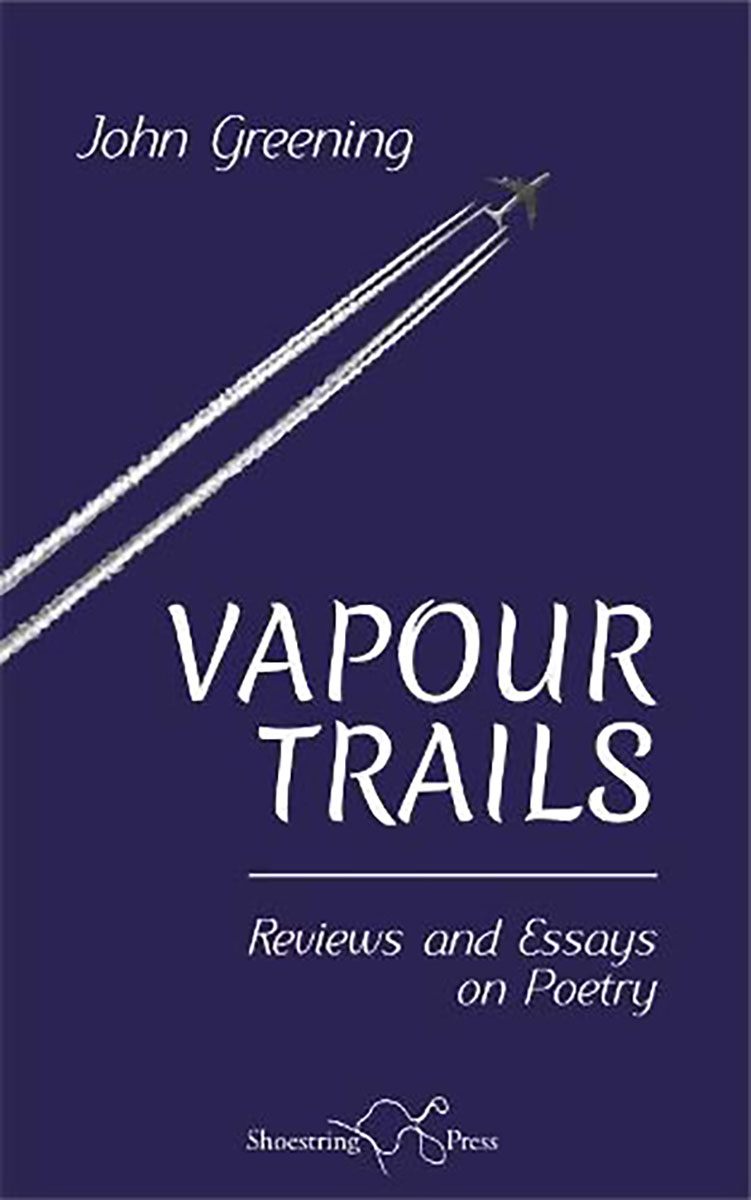Robert Selby on an engrossing collection of reviews and essays assembled over the course of thirty years
Robert Selby
-

Vapour Trails
John Greening
Shoestring Press • £12.50
‘Why would anyone want to read old reviews by someone who isn’t even in an English Department, who understands next to nothing about Theory?’ So asks John Greening in the preface to this selection of his reviews and essays, all of which have previously appeared in august literary organs of one kind or another, mainly here or across the Atlantic, over the past three decades. Greening’s characteristic modesty is, on this one occasion, surely less than sincere: the so-called drawbacks he mentions are, of course, advantages when it comes to engaging the general reader to whom he is aiming. We have here a highly readable volume, testament to a selfless diligence, the poet giving some of the precious time he has left over after school-teaching not to his own verse but to the verse of others.
Vapour Trails runs an empathetic gaze over 50 poets, with 32 in the opening section titled ‘Varieties of Englishness’, sequenced by date of birth, beginning with Edward Thomas (b.1878) and ending with Simon Armitage (b.1963). Greening, in his preface, keeps ‘Englishness’ necessarily in inverted commas as several of these poets were born elsewhere (Fleur Adcock, Mimi Khalvati, George Szirtes and Michael Donaghy, for example) and ‘might not be comfortable with the idea’ of being thus bracketed, while others are dual nationals reputationally-speaking (Thom Gunn, namely). Greening does put his foot down, however: ‘I believe there is still such a thing as English poetry.’ But, frustratingly, he doesn’t then set out what he believes are its defining characteristics. The remaining 18 poets appear in the section ‘Across Borders’, sequenced by nationality as well as date of birth – Scottish, Welsh, Irish, American, and Gerđur Kristný (b.1970, the youngest inclusion) representing Iceland.
Not including poets under the age of 50 ensures Vapour Trails is a gathering of retrospectives, many posthumous. Those whose reputations seem assured are here – Ted Hughes, for example (the publication of Birthday Letters Greening describes as ‘poetry’s own Harry Potter moment’), Robert Lowell (who ‘suffered and made many of those closest to him suffer’), Elizabeth Bishop (‘there is something of the pleasure of receiving a really engrossing letter’), John Berryman (‘too richly seasoned’). But, as is usual with such compendiums, it is in the reappraisal of the lesser lights where the real enjoyment lies: Norman Nicholson (‘a voice whose innocence is perhaps the key to its endangered status’), CH Sisson (‘tetchy obliqueness’), Vernon Watkins (‘a master of the striking opening’), Amy Clampitt (‘rococo’). When the scramble net he sends down into oblivion reaches Andrew Young, Greening’s commentary on the Scottish-Sussex poet is instructive of his own careful method and kindliness: ‘So what should we do with Andrew Young? The plain answer is to read him, not just to think we know what he’s about and so leave him alone’. The mastery of Greening’s take on Edmund Blunden (‘he is not a complacent pastoralist; he is terrifying’) is to be expected from the editor of an important new edition of Blunden’s Undertones of War, while his treatise on Edwin Muir – building on those by Seamus Heaney and Mick Imlah – is further proof that Muir, while not the very best of poets, certainly brings out the best in critical writers:
There is, inevitably, a good deal of abstraction. This weighs heavily by page 289 of Edwin Muir’s Collected Poems, yet on that page we find a poem titled ‘Petrol Shortage’ to remind us that this poet inhabited the everyday world like the rest of us.
That everyday clarity is an attribute of Greening’s own poetry, and the third and final section of Vapour Trails consists of four autobiographical pieces that help locate the man and poet behind the critic, revealing, if we didn’t know it already, a tirelessness well into his seventh decade. He feels affinity with Charles Causley, ‘a man who managed to keep the literary life and the school life running in parallel until he was 59’, and believes that, for poets, ‘fatigue can be creative’. The volume signs off with the titular essay ‘Vapour Trails’ – previously published in Andrew McNeillie’s journal of scenic psychogeography, Archipelago – in which Greening touches on his youth growing up next to Heathrow Airport and immerses us in the literary essence of wide-skied Huntingdonshire (not least Little Gidding), the technically extinct county he has lived in for nearly forty years and about which he has been quietly accumulating a body of poems at least as impressive as his prose. Greening’s observations on his late friend Dennis O’Driscoll, also in this volume, could just as easily be written of himself and Vapour Trails: ‘He read vastly and his critical insights came from true passion, not from any academic sausage machine. He knew, in other words, what writing is for, and that readers are busy people.’
Robert Selby co-edited Mick Imlah: Selected Prose (Peter Lang, 2015). His debut collection, The Coming-Down Time, was published in 2020 and his second collection, The Kentish Rebellion, will be published in July 2022, both from Shoestring Press. He edits the poetry journal Wild Court.

